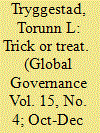| Srl | Item |
| 1 |
ID:
092259


|
|
|
|
|
| Publication |
2009.
|
| Summary/Abstract |
The adoption in October 2000 of UN Security Council Resolution 1325 on Women, Peace and Security is regarded as a groundbreaking achievement in putting women's rights on the peace and security agenda of the UN. Critics have suggested that the adoption of this resolution has made little difference in terms of changed policies and practices. I argue, however, that it has nevertheless made a difference. The adoption of Resolution 1325 is the expression of a new norm in the making. Furthermore, it illustrates how cross-cutting thematic issues such as "women, peace, and security" today are placed on the agenda and nurtured by the UN Secretariat in close cooperation not only with member states, but, just as important, with networks of nongovernmental organizations and individual experts
|
|
|
|
|
|
|
|
|
|
|
|
|
|
|
|
| 2 |
ID:
171961


|
|
|
|
|
| Summary/Abstract |
By implementing novel intelligence techniques in cyberspace, security and intelligence agencies have become major actors in the cybersecurity landscape. As they no longer just passively gather information for their governments but conduct both defense and offense operations in cyberspace, they signal international actors that their conduct is at least tolerable, even if not officially acceptable. Thereby, the intelligence agencies generate norms for the rest of the international community. Yet, they remain under the international regulation radar for being sub-state entities. Consequently, the main argument of this article is the following: To prevent the hollowing-out of cyber regulation efforts, the norm-setting role of intelligence actors should be taken into account when designing cyber norms.
|
|
|
|
|
|
|
|
|
|
|
|
|
|
|
|